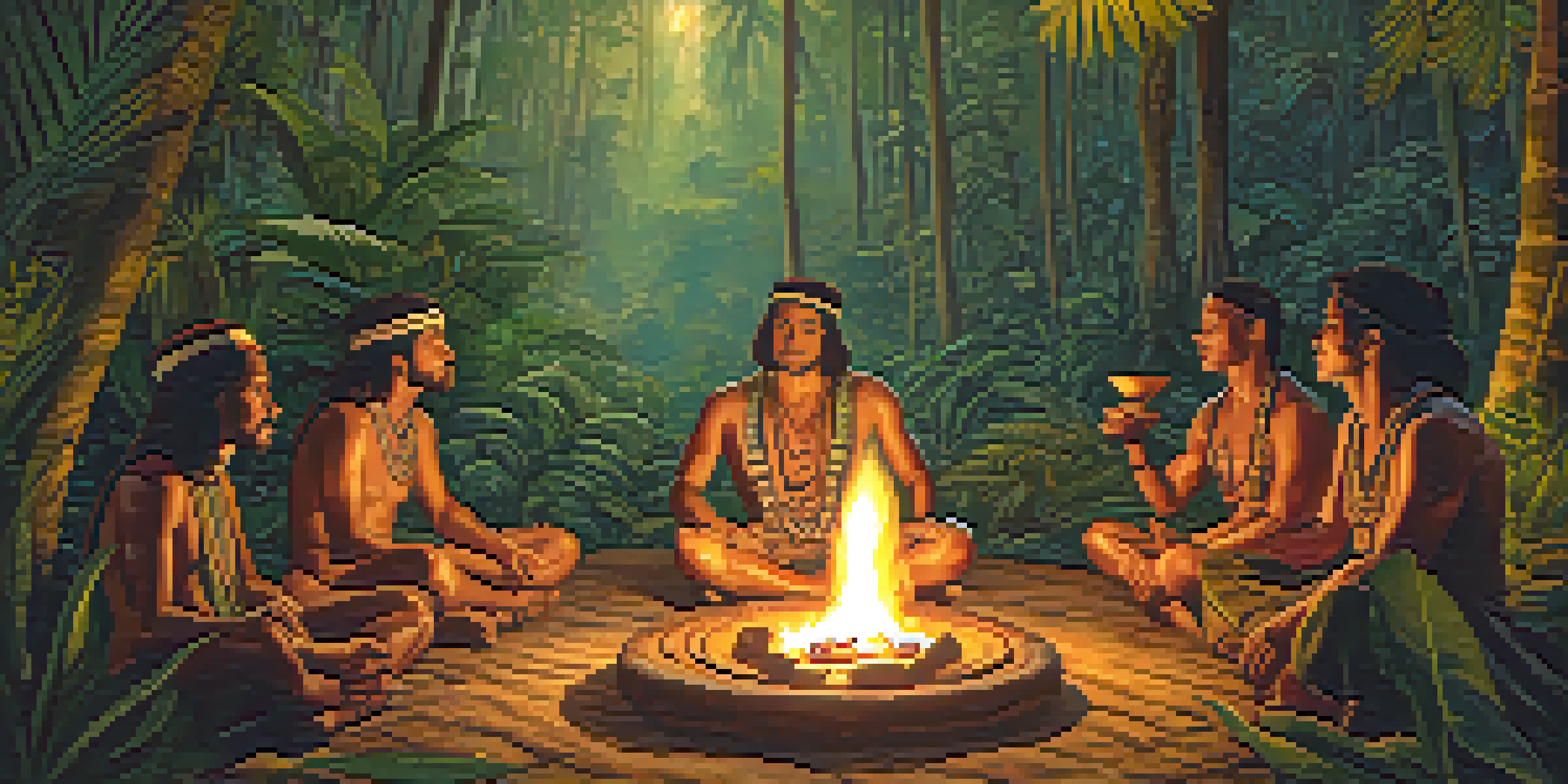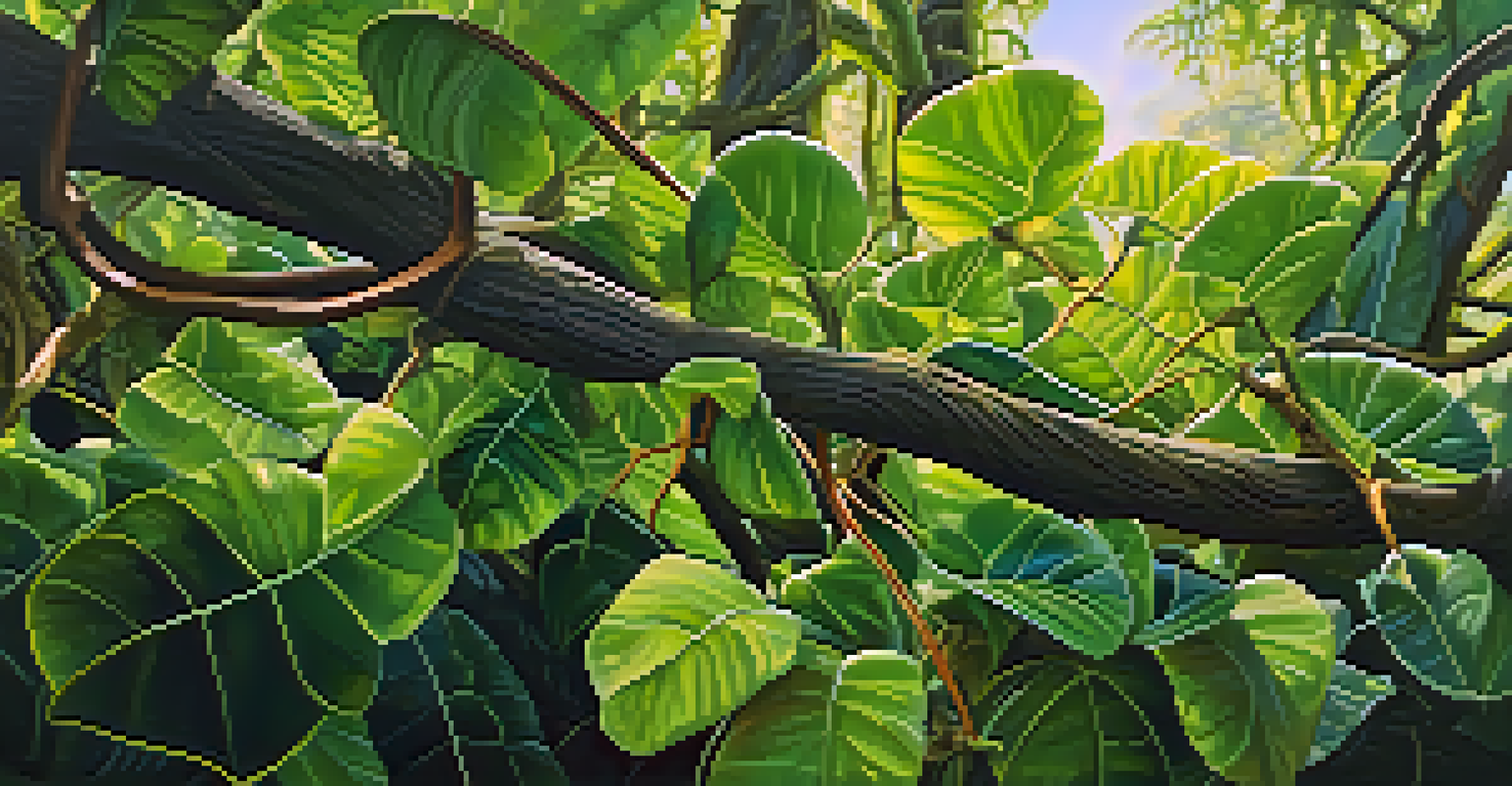Ayahuasca and Indigenous Cosmology: The Spiritual Connection

Understanding Ayahuasca: The Sacred Brew
Ayahuasca is a traditional herbal brew originating from the Amazon, primarily used by Indigenous tribes for spiritual and healing purposes. This concoction, made from the Banisteriopsis caapi vine and other plants, is renowned for its psychoactive properties, which can lead to profound spiritual experiences. For many Indigenous cultures, Ayahuasca is not just a drink; it's considered a sacred medicine that connects them to the spiritual realm.
Ayahuasca is a teacher that reveals hidden truths about existence.
The effects of Ayahuasca can vary widely, from vivid visions to deep emotional introspection. Many users report experiencing a heightened sense of connection to nature and the universe, which aligns with Indigenous cosmological beliefs. The brew serves as a bridge, allowing individuals to explore their consciousness and gain insights into their lives and the world around them.
In ceremonies led by experienced shamans, participants often engage in rituals that involve singing, chanting, and dancing. This communal aspect enhances the experience, reinforcing the idea that Ayahuasca is a tool for collective healing and spiritual growth, not just individual exploration.
The Role of Indigenous Shamans in Ayahuasca Rituals
Indigenous shamans are pivotal figures in the use of Ayahuasca, serving as guides and healers during ceremonies. They possess extensive knowledge of the plants, the brew's effects, and the spiritual teachings associated with it. This deep understanding allows them to create a safe environment for participants, ensuring that the experience is both meaningful and transformative.

Shamans often use specific songs, known as icaros, which are believed to invoke spirits and facilitate healing. These songs are a vital part of the ceremony, helping participants navigate their journeys and connect with the spiritual world. The shaman's role as a mediator between the physical and spiritual realms is crucial in Indigenous cosmology, emphasizing the interconnectedness of all beings.
Ayahuasca: A Sacred Healing Brew
Ayahuasca is a traditional Amazonian brew used by Indigenous cultures for spiritual healing and profound consciousness exploration.
Moreover, the shaman's wisdom is rooted in centuries of tradition and cultural practices. Their role extends beyond the ceremony, as they often provide ongoing support and guidance to individuals seeking to integrate their experiences into daily life, highlighting the importance of community and continuity in Indigenous cultures.
Indigenous Cosmology: A Web of Spiritual Interconnections
Indigenous cosmology is a rich tapestry of beliefs, stories, and practices that explain the universe and humanity's place within it. Central to many Indigenous cultures is the idea that everything is interconnected, from the smallest insects to the vast cosmos. This perspective fosters a deep respect for nature and emphasizes the importance of living harmoniously within the environment.
The shaman's role as a mediator between the physical and spiritual realms is crucial in Indigenous cosmology.
In many Indigenous belief systems, Ayahuasca is viewed as a powerful teacher that reveals hidden truths about existence. The visions it induces often provide insights into the natural world, the spirit world, and, ultimately, the self. This aligns with the cosmological view that understanding oneself is essential to understanding one's relationship with the universe.
Through Ayahuasca, participants may experience a sense of unity with all living beings, reinforcing the cosmological belief that we are all part of a greater whole. This profound realization can lead to a transformative shift in perspective, encouraging individuals to adopt more sustainable and respectful practices in their daily lives.
Healing and Transformation: The Ayahuasca Experience
Many who partake in Ayahuasca ceremonies seek healing, whether physical, emotional, or spiritual. The brew is often used to confront past traumas, unresolved emotions, and personal challenges. By facilitating deep introspection and emotional release, Ayahuasca can catalyze profound transformation, helping individuals move forward in their lives with renewed clarity and purpose.
The healing process during an Ayahuasca ceremony is unique for everyone, often described as a journey of self-discovery. Participants may encounter challenging emotions or memories, but with the guidance of the shaman and the support of the community, they can navigate these experiences safely. This journey is a testament to the resilience of the human spirit and the potential for growth through adversity.
Indigenous Shamans Guide Ceremonies
Shamans play a crucial role in Ayahuasca rituals, using their extensive knowledge to facilitate safe and transformative experiences.
Furthermore, many participants report feeling a sense of rebirth after their experience, as if they have shed layers of past burdens. This transformative aspect of Ayahuasca is deeply rooted in Indigenous healing practices, where the emphasis is placed on holistic well-being and the integration of mind, body, and spirit.
The Intersection of Science and Indigenous Wisdom
In recent years, there has been a growing interest in understanding the effects of Ayahuasca through scientific research. Studies have shown that the brew can have significant therapeutic benefits, particularly for conditions like depression, anxiety, and PTSD. This has sparked a dialogue between modern science and traditional Indigenous knowledge, highlighting the importance of both perspectives in addressing mental health issues.
Researchers are exploring the biochemical effects of Ayahuasca's active compounds, such as DMT (dimethyltryptamine), and how they interact with the brain. These findings are beginning to validate the experiences reported by participants and the wisdom of Indigenous practitioners who have used the brew for centuries. This intersection of science and spirituality emphasizes the need for a holistic approach to healing.
However, it's essential to approach this research with respect for Indigenous cultures and their practices. The commercialization of Ayahuasca can lead to ethical concerns, and it's crucial to prioritize the voices and rights of the Indigenous communities who have safeguarded this sacred tradition for generations.
Cultural Appropriation vs. Cultural Appreciation
As Ayahuasca gains popularity outside Indigenous communities, the line between cultural appropriation and appreciation becomes blurred. Many non-Indigenous individuals seek out Ayahuasca experiences, often without a full understanding of its cultural significance. This raises important questions about respect, understanding, and the ethical implications of engaging with Indigenous practices.
Cultural appropriation occurs when elements of a culture are taken out of context and used without understanding or respect for their original meaning. In the case of Ayahuasca, this can manifest as commercialized retreats that strip the practice of its spiritual and cultural significance. It's essential for those interested in Ayahuasca to approach it with humility and a willingness to learn from the Indigenous communities that have nurtured this tradition.
Respecting Cultural Context Matters
As interest in Ayahuasca grows, it's vital to distinguish between cultural appropriation and appreciation to honor Indigenous traditions.
On the other hand, cultural appreciation involves recognizing and honoring the cultural context while engaging respectfully. This can include supporting Indigenous-led ceremonies, learning about the traditions, and understanding the significance of Ayahuasca within those cultures. Striking this balance is crucial to fostering genuine connections and respecting the heritage of Indigenous peoples.
The Future of Ayahuasca and Indigenous Practices
As interest in Ayahuasca continues to grow globally, the future of its practice and the preservation of Indigenous traditions hangs in the balance. It's essential to ensure that Indigenous voices are at the forefront of discussions surrounding Ayahuasca, as they hold the knowledge and wisdom that have been passed down through generations. Empowering these communities is vital for the sustainable practice of Ayahuasca in a way that honors its roots.
Furthermore, as more people engage with Ayahuasca, there is a pressing need for education around its use and the cultural contexts from which it originates. This can help mitigate potential harm and promote respectful engagement with Indigenous practices. Creating spaces for dialogue between Indigenous communities and those interested in Ayahuasca can foster understanding and mutual respect.

Ultimately, the future of Ayahuasca is intertwined with the health and vitality of Indigenous cultures. By prioritizing their rights and perspectives, we can ensure that Ayahuasca remains a sacred practice that continues to heal and transform lives while preserving its rich cultural heritage.